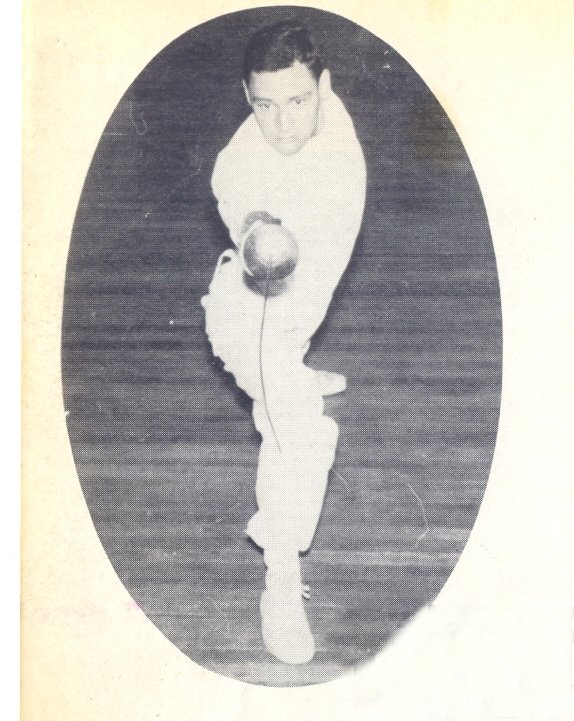June
11, 2008
To:
Dr. Arthur D. Tauber, a Personal Tribute
I
first got interested in fencing at summer camp where I met Paul Peyser
who was a fencing instructor/counselor. Through our teacher-student
relationship, I grew to enjoy fencing and saw it as a challenge of personal
accomplishment. A one-on-one chess match on a strip - distance, timing
and execution - the basics.
Mostly,
I began to hear from Paul about the legendary figure, the “Coach,”
who made an indelible impact on the lives of everyone who met him. Fencing
would become for me, during high school, and opportunity to anticipate
meeting the “Coach.”
So
it was a natural event when, in my freshman year at Y.U., I signed up
for fencing as my athletic activity. At first, it was daunting. Watching
and admiring competitors like the tall, slender epee-men who seemed
to be the Coach’s focus.
The
normal rhythm of practice brought with it a discipline - a calisthenics
warm-up, practicing basic lunges, pairing off and fencing, and then,
with time, the ultimate gift came my way - a lesson from the “Coach.”-
Oh My G-d!
The
lessons and the discipline extended from the run-down “gym”
to the dorm. 8-10 Mondays and Wednesdays was practice followed by homework.
Camaraderies developed between fencer and fencers and between the fencers
and the wrestlers who shared the gym. Some of these friendships would
last a lifetime.
Then
came the bouts, the competitions - some elating, some disappointing.
At times, it was difficult for the Team to win, as against some of the
New Jersey schools. We looked forward anxiously to fencing some of the
better schools, including Columbia.
My
life was in turmoil at the time. My father had died when I was 16. My
mother underwent surgery and chemotherapy in 1961 and died in 1962.
Life was extremely unsettling. Fencing was very anchoring. The master
of the austere façade, the “Coach” proved to be very
human! There was always the understanding but the uncompromising fencing
master ever-prodding his wards to achieve excellence (each as they might
know it) and then there was the after-practice “Coach” who
you could sit with in his office (as it were) and discuss a goal, a
personal matter, etc. Throughout it all, the “Coach” was
giving you his total focus and the benefit of his own experience. Not
until many years later, when I became familiar with his NYU fencing
record and his IFA Championship bouts in 1942, was I able to realize
how much he was able to draw on his own personal strengths, built by
his own experiences. I always wondered how he might have been treated
in 1942, as he seemed headed for a multi-weapon championship, had he
not been Jewish. Ah well, a sign of the times...!
But
the Coach’s dignity, his conviction that what you made of yourself
was largely up to you, the results of your own efforts, energy, dedication,
security, tenacity and determination gave many a young man the tools
needed in order to advance into adulthood. So the “Coach”
didn’t just teach fencing - he taught life, or the disciplines
of life - and so many people went away from their experiences marveling
at the human being that they first viewed as a fencing instructor but
came to know as a life force.
The
Coach’s lessons have guided me through my personal and professional
life. The Jewish values he evinces - the dignity, respect for each and
every human being that he encountered, the role of the teacher/master
and the sense of obligation or opportunity to help others who are coming
up behind you, have served me well long since my last bout or lesson.
He taught the discipline of excelling in one’s chosen field and
in treating each person (or patient) with the same dignity and discipline
and humility, in order to help them address their issues or conquer
their disease, and the dedication to family that was always the hallmark
of his world. And the energy that says that the outcomes of one’s
own life are determined by the forces of one’s own energy - G-d
willing - that one must work in order to make life fulfilling and that
the work is, in part, the reward itself.
The
“Coach” was a guiding force to so many people over their
lives, that each in their own way, has claimed the “Coach”
to be his own. How delightful that in one’s lifetime so many people
can claim and acknowledge what a truly special influence the “Coach”
has been! That truth is broadly appreciated whether as individuals or
as a united and like-minded group.
I
hope that the “Coach” can bask in the light and the warmth
of this rare, yet magnificent adulation and enjoy these wonderful feelings
for many years to come in good health, surrounded by his loving wife,
Lenore, and family- “Ad Me’ah V’esrim Shanah.”
With
great admiration,
Warren
E. Enker |
